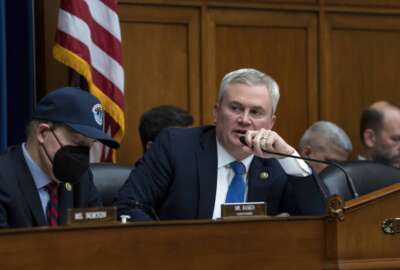
A fresh legislative effort to get federal employees back into the office
Now there's a Senate version of the Show-Up act, designed to get more federal employees to return to their offices to work. In fact, it's getting a lot of...
Now there’s a Senate version of the Show-Up Act, designed to get more federal employees to return to their offices to work. In fact, it’s getting a lot of attention, even as the debt ceiling uncertainty continues. For the latest, Federal Drive with Tom Temin spoke with WTOP Capitol Hill Correspondent Mitchell Miller.
Interview Transcript:
Tom Temin So tell us more about the Senate version of a bill that has worried at least some federal employees for some time now.
Mitchell Miller Right. Well, it’s certainly been getting a lot of attention in the House, where House Oversight Committee Chair James Comer has really been pushing it for several weeks. And then recently the Senate Republicans decided they were going to take up the Show Up Act. And the lead senator on this is Senator Marsha Blackburn of Tennessee. She is highly critical of many federal employees, frankly, about where they’re going and when they’re not going to the office. And she just believes that, like Comer and a lot of Republicans, that not enough federal employees have been getting back to the office as quickly as they would like. They’re getting some pushback from Democrats, as you know, who have said, well, there are a lot of positives related to telework. And that’s not just exaggerate the impact of actually bringing people back into what are now many empty offices. But this is something that’s going to be seriously pushed now by the Republican senators. Whether it can actually get over the hump and actually get into law is doubtful, but it’s certainly going to be on the radar for federal employees and their managers over the next few weeks and months.
Tom Temin Yeah, and we know the administration is struggling with this, too, because it issued guidance to get people more at work. And that was the stated goal. I don’t think anyone’s actually paying a lot of attention to that guidance, to be honest with you, from what we hear at the ground level.
Mitchell Miller Right. And as we’ve talked about, there seems to be confusion about what it actually means for a lot of different agencies. It’s interesting that this also came up in the House, in the House Oversight Committee. There was a hearing last week related to D.C. and while it primarily dealt with crime, Mayor Muriel Bowser was in front of lawmakers for several hours. They did touch on the fact that there are not enough federal workers in the view of many heading back into those offices in downtown D.C. And it’s interesting that there was kind of a grudging respect between the Republicans on the committee who are often just firing political missiles at D.C. and the mayor. They both share a view that they do want to see more federal workers coming into the downtown buildings. Both sides acknowledging the fact that there is simply a loss of a lot of tax revenue because those offices are not being used as much. All of the attendant businesses that are around, whether it’s for lunch or selling retail, those are also hurting. So it was a really interesting conversation between the mayor and many Republican lawmakers who are concerned about this.
Tom Temin Well, maybe the feds at home could order takeout from downtown. The taxes come in, but they don’t have to go to the office to get it. Not suggesting that. But federal employees in a little bit more sinister and realistic way are probably nervous. There was the attack on the staff member of Gerry Connolly of Virginia, and this follows on the Paul Pelosi attack and it follows on the attack on one of the staffers for Senator Rand Paul. And so there’s a drumbeat of these things happening, and this is starting to maybe coalesce into some real concern up there.
Mitchell Miller Absolutely. This has really shaken a lot of lawmakers because they’ve been talking about this for a long time. And now to see it actually happen, whether, as you said, it was Paul Pelosi, the husband of former House Speaker Nancy Pelosi, or in this case last week, where a man who apparently has some mental issues came in with a metal baseball bat and just started whipping it around at staffers in Gerry Connolly’s office in Fairfax, he was not there, and then just flew into a rage and knocked up a bunch of equipment and everything. All of this coalescing to make lawmakers talk about this, like what is going to happen with their staff members, with their family. Obviously, lawmakers are very protective of the people that they work with. And this has been talked about for quite a while. I’ve talked about it with U.S. Capitol Police Chief Tom Manger over the last several months. And in fact, he testified last week before Congress and said, look, there has been a 400% increase in the number of investigations that they’ve had to carry out related to threats over the last six years and it is way higher than it used to be. And they have put out field officers in California and in Florida. But there’s a real discussion here on Capitol Hill about what kind of resources can go out to lawmakers and their staffs. Do they get more money for officers that are physically out in the field? Do they get more resources for intelligence? Do they get more camera equipment, for example, to carry out security? So definitely a lot of nervousness related to this and a lot of attention going toward these attacks that have happened recently.
Tom Temin We’re speaking with WTOP Capitol Hill correspondent Mitchell Miller, and then the postmaster general, Louis DeJoy, he got grilling on something that’s again a perennial topic, but it ebbs and flows depending on the economy and the time of year, and that is thefts from and attacks on postal workers out there trying to deliver mail and packages.
Mitchell Miller Right. This was the first time that he had testified before the House Government Operations Subcommittee in more than two years. And after they talked about some of the financial issues, which are always a perennial with the postal service, that was the one that lawmakers really honed in on, particularly Maryland Congressman Kweisi Mfume, who represents a large part of Baltimore, said they have gone from the issue of getting bad delivery rates, which were a huge problem during the pandemic, to these issues related to mail being stolen and also these attacks that are actually occurring on postal worker themselves. And just looking at some of the figures related to the complaints that they’ve had. The Postal Service, according to the Postal Inspection Service, has had close to 300,000 complaints about mail theft over a period of about a year. That’s more than double what it was the previous year that it was measured. And they’ve also had a lot of check fraud reports where people are literally breaking in and taking checks and stealing money from people. And then you also have the increase and the attacks on the postal workers themselves. Those have gone up quite a bit. And Postmaster General DeJoy obviously got a lot of questions about that. What are you doing to protect the people that are delivering the mail? That was a question that Jamie Raskin, the Maryland congressman, had. And DeJoy really, frankly, didn’t have a lot of answers. He said, look, I only have so many resources and there’s only so many people I can get out to protect people out in the field, kind of overlapping some of the things that we just talked about with lawmakers. So security really a big issue there for postal workers.
Tom Temin And, of course, the big anxious overlay on all of this is the debt ceiling talks that seem to be an unhappy merry-go-round where the same broken horse keeps coming round and around and it doesn’t get fixed on the back side.
Mitchell Miller No. And the merry-go-round was moving fairly smoothly for much of last week. And then all of a sudden we found that broken horse once again on Friday. There was clearly some frustrations. They basically said, we’re going to have a pause on these talks between the White House team and those close to House Speaker Kevin McCarthy. And now it looks like we’re going to get into a little bit of a stalemate again. Part of this is because the fringes of both parties are now putting a lot of pressure on the negotiators. On the Republican side, the House Freedom Caucus, the conservatives saying, wait a second, we passed a bill in the House. How come the Senate is doing absolutely nothing with it? They issued a statement late last week, and I think that may have put some pressure on some of the speaker’s negotiators to maybe try to stand tall in these negotiations. And then on the flip side, on the Democratic side, you have a lot of progressives are really concerned about these proposals from the Republicans that would make more requirements for work requirements for Medicaid, for food stamps, welfare programs. And the Republicans are pushing back on that. So while there was a lot of progress last week, it’s going to be interesting to see how that carousel starts to grind away and move around again this week. Certainly, they are going to have to have some significant progress this week because as we both know, the pending debt deadline is potentially as close as June 1st. So that does not leave a lot of time on the calendar for them to do this.
Copyright © 2025 Federal News Network. All rights reserved. This website is not intended for users located within the European Economic Area.
Tom Temin is host of the Federal Drive and has been providing insight on federal technology and management issues for more than 30 years.
Follow @tteminWFED





